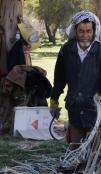|
The presence of explosive hazards in areas liberated from IS occupation in Iraq will continue to impede security, stability and humanitarian efforts, if not appropriately addressed. The UNMAS (United Nations Mine Action Service) programme is implementing a multi-year comprehensive response in Iraq to addressing the problem of explosive hazards (EH), including improvised explosive devices (IEDs). UNMAS Iraq is working closely with the UN and the Government of Iraq as an enabler of stabilisation, and it must be noted that explosive hazard survey and clearance are necessary precursors to allow stabilisation initiatives to safely begin. In addition, UNMAS Iraq is a key facilitator of humanitarian assistance, particularly in Mosul and surrounding areas. This response includes survey assessments, explosive hazard management operations, and coordination of (as well as engagement with and capacity enhancement of) the relevant authorities.
Despite the continuous efforts of civilian entities and the Iraqi Security Forces, the presence of EHs and specifically improvised explosive devices (IEDs) in areas liberated from IS continue to impede stabilisation, humanitarian, security and development efforts, until such hazards are removed. Clearance operations are a pre-requisite to safe returns, sustainable solutions, reconstruction and rehabilitation of key infrastructure and homes, promoting livelihood opportunities and social cohesion activities in liberated areas.
- Since 2016, UNMAS Iraq has taken a strategic, multi-year comprehensive approach to clearance operations, supported by multi-donor contributions to fund three pillars of work:
- Explosive hazard management (EHM) in areas previously under IS occupation
- Risk education (RE) to at-risk populations, including IDPs and returnees
- Capacity enhancement (known as Technical Support) of national authorities to manage, regulate and coordinate a response to EHs.
- UNMAS Iraq has been conducting an explosive hazard management (EHM) response, in support of both stabilisation and humanitarian priorities. The bulk of the response has been in collaboration with the Government-UNDP Funding Facility for Stabilization (FFS), to ensure timely rehabilitation of key infrastructure and facilities. UNMAS Iraq is also supporting other humanitarian, development and stabilisation interventions, in partnership with other UN entities and the Government of Iraq.
- Since 2016, UNMAS Iraq has conducted operations at approximately 1 471 FFS sites in the Nineveh, Kirkuk, Anbar and Salah ad-Din Governorates, including hospitals, schools, water treatment and power plants, as well as bridges that are affected by unprecedented quantities of explosive hazards (EHs), such as Improvise Explosive Devices (IED) left behind by IS.
- UNMAS has surveyed and cleared over 278 million square meters of FFS sites, and rendered safe over 50,000 explosive hazards, including 2,000 IEDs. Note that UNMAS Iraq does not receive FFS funds, but instead receives bilateral funding from the donor governments.
- One stabilisation task can range from clearing a school, which may be concluded within half a day, to large scale infrastructure - a factory, for example - which can take months to fully clear.
- Intention returns: Among IDPs surveyed across Iraq, 77% of in-camp IDP households reported complete or heavy damage to their home. 37% cited such damage or destruction as their primary reason for not returning to their areas of origin[1].
- Risk Education: UNMAS has provided education for over 1 million civilians at risk of EH dangers, both through direct sessions and innovative solutions, such as social media, radio and television messages, murals and virtual reality googles. Risk Education in camps is UNMAS’s starting point for providing a holistic end to end solution, which is inclusive and needs focused. By providing information, education, and useful tools for IDPs, UNMAS can have a direct impact on their willingness and confidence to return.
- Technical Support: Concerning technical support to the Government of Iraq (GoI), UNMAS Iraq is closely working with the Directorate of Mine Action and the Iraqi Kurdistan Mine Action Agency, with the aim of strengthening the abilities of relevant entities to manage, regulate and coordinate an effective and gender mainstreamed explosive hazard management response. The end-goal is to improve the safety and wellbeing of all Iraqis. UNMAS Iraq is working closely with GoI mine action entities to identify gaps in coordination and response through the following activities, amongst others.
- Adopting a roadmap to overcome challenges.
- Providing technical support to gender units on the development of action and advocacy plans.
- Supporting the review and development of mine action strategies, policies and standard working practices through a gender lens.
- Providing workshops on mainstreaming gender in explosive hazard management, including planning and prioritisation.
- Training to the Ministry of Interior: Additionally, UNMAS Iraq has also conducted numerous training sessions with the Ministry of Interior (MoI) on Explosive Ordnance Disposal and Improvised Explosive Device Defeat in Baghdad. Notably, UNMAS Iraq provided Explosive Hazard First Responder training to over 900 police officers, including 30 women.
|




